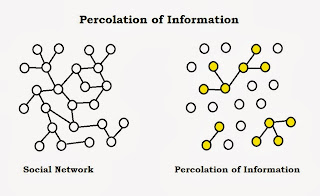Dr. Leonard
Mlodinow’s book Subliminal-How your Unconscious Mind Rules Your Behavior
focuses on understanding the underpinnings of human thought and how this
impacts just about everything within our lives. He graduated with his doctorate
from the University of California Berkeley in physics. He enjoys working with
concepts in mathematics, chemistry, laws of nature and the
unconscious mind. Furthermore, he also
works as a screenwriter, playwright, and academia.
Carl Jung once stated, “These subliminal aspects of everything that
happens to us may seem to play very little part in our daily lives. But they
are almost invisible roots of our conscious thoughts.”
The unconscious mind is a
two tier system of conscious thought processes and unconscious activity. Consciousness can only handle and process a
small percentage of information. The unconscious is a much stronger system that
collects, connects, and processes greater amounts of information for further
use. It is a system designed to allow us to focus on one complex task while
still being aware of our surroundings.
Senses plus mind equal the
subconscious. Since the ancient Greeks
man has sought to see how the processes work together. The unconscious has its
own way of viewing the world and draws information through the senses. For
example, research on blindsight indicates that some humans have the amazing
ability to see and understand where they are in relation to other objects
without the ability to actually see them. The unconscious uses various data
from the environment to navigate, function and ensure survival. This is the reality in which we perceive.
"Your amicable words mean nothing if your body seems
to be saying something different"-James Borg
Our subconscious mind also
affords the opportunity to understand human beings without formal language. If
we listen to the words of someone but fail to have that same impression from
their body language, choice of words, and patterns of speech, etc... we are likely to
correctly conclude they can’t be trusted. The same process, to a lower level,
exists in animals that seek to understand friend or foe when meeting others
within the same species.
"All groups…develop a way of living with
characteristic codes and beliefs" –Gordon Allport
Each group creates special
meaning and language that impacts their identity. Those outside of the group
will have a difficult time understanding what these special codes and language
choices mean. As the group forms and identity it is the understandings and subtle
impressions they give each other that helps to create the way in which they see
themselves. Their approach and beliefs in the world create the in and out group
phenomenon.
The book is written for an
audience of casual readers. It is something that readers of Psychology Today
are likely to pick up. It will make great conversation while dining with
others. It does offer some level of
scientific value in terms of giving a broad overview of the subconscious
process. It doesn’t go into specific depth on any of the experiments and what
their far reaching implications are. You can learn something about
neuroscience. It is worth the read and is listed as a best seller.
Mlodinow, L. ( 2012). Subliminal-How your Unconscious Mind Rules Your
Behavior. Vintage Books; NY. ISBN:
978-0-307-47225-0
